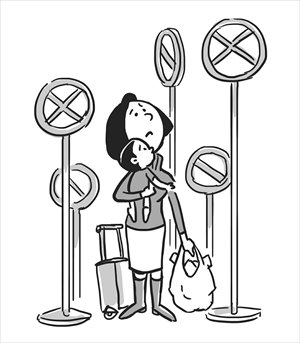Migrant systems unjust, but reform hard

The US is a land full of opportunities, or so they say. So many of my friends in China were stunned that I have spent most of my time in the US working for the same company. Without changing jobs it's hard to boost salaries, and "you'll be left behind by inflation," they warned me.
But inflation has not been my concern for a long time. Like many newcomers to this country, I knew that without getting a green card I was far from being an insider and even the inflation was someone else's story.
There are many legitimate or not-so-legitimate lawyers who can help you get a green card quickly through legitimate or not-so-legitimate ways for a lot of money. But I chose to stick to low costs, which meant I engaged in the simple but very lengthy process of an employment-based application. By the time I got my green card, I'd been waiting in the queue for seven years.
In the year my company filed the application for me, a friend of mine in China moved to Beijing from a smaller city to pursue the apparently endless opportunities in the capital city. Over the following years, she worked for several employers who promised her a Beijing household registration, or hukou, but eventually ate their words.
Then she enrolled in a PhD program in a university in Beijing, hoping this could get her a hukou in the special high achievers' category. In the last year of her post-doctorate period, her son was born. Because my friend was a student and didn't have the proper documents, the baby was not able to get his hukou either. By the time I got my green card, she was still struggling in this limbo.
Hu Zuliu, CEO of Primavera Capital, said at the recent Boao Forum for Asia that the hukou system in China is comparable to slavery. Slavery aside, there are a lot of similarities between the immigration system in the US and the hukou system in China.
They both intend to manage people by a set of identification documents. They both divide people into different classes in practice and force those at the bottom to live with lower wages, exploitation, fewer rights, and a lot of frustration until they get the papers that allow them to climb to a higher rung. They have both developed in a similar way. They are now both facing reforms.
But in some sense, my friend in Beijing may be in a worse situation. At least, non-green card holders in the US, be they foreign students, foreign workers or even illegal immigrants, can enroll their kids in public schools without paying extra, purchase real estate as long as they have enough money, and their US-born children get automatic citizenship. Without a Beijing hukou, my friend cannot access any of these in the city.
But what makes mobile workers in China feel really bad is that while immigrants may be labeled second-class citizens in a foreign country, migrants in China are suffering the same in their own.
The debates on the reforms of both hukou and US immigration policies will eventually come down to dollars and sense. What has to be answered is whether the increase in millions people paying taxes and spending money, but also being eligible for welfare, makes economic sense.
Eight key Senators in US Congress came to an agreement on a bipartisan proposal for immigration reform recently, which allows the 11 million illegal immigrants in the country to eventually get citizenship, at the price of a fine. But it will take them at least 13 years to do so, which prevents them from claiming welfare for that period. And it also requires better systems to stop the influx of illegal immigrants.
In China, hukou reforms are facing the same challenge. Resources in big cities are limited and they may be eaten up if tens of millions people suddenly move in should the restrictions be lifted. But the tsunami of people cannot be eased by border controls at the outskirts of cities.
The hukou system is inhumane and unhealthy for a country that is aging and tasting a labor shortage. But to eliminate it overnight would cause havoc. And that is inhumane and unhealthy too. The key for a successful reform is to find the right pace for loosening up the restrictions.
The author is a New York-based journalist. rong_xiaoqing@hotmail.com